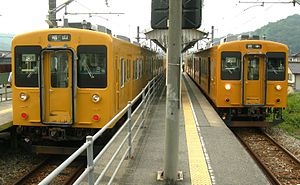Fukuen Line
This article needs additional citations for verification. (October 2015) |
| Fukuen Line | |
|---|---|
 | |
 105 series EMUs at Yokoo Station, July 2011 | |
| Overview | |
| Native name | 福塩線 |
| Owner | |
| Locale | Hiroshima Prefecture |
| Termini | |
| Stations | 27 |
| Service | |
| Type | Heavy rail |
| Operator(s) | JR West |
| Technical | |
| Line length | 78.0 km (48.5 mi) |
| Track gauge | 1,067 mm (3 ft 6 in) |
| Electrification | 1,500 V DC, overhead lines (Fukuyama–Fuchū) |
The Fukuen Line (福塩線, Fukuen-sen) is a railway line in Hiroshima Prefecture, Japan, operated by the West Japan Railway Company (JR West). It connects Fukuyama Station in Fukuyama to Miyoshi Station in Miyoshi.
Stations
[edit]| Line | Name | Distance (km) | Transfers | Location | ||
|---|---|---|---|---|---|---|
| Fukuen Line | Fukuyama | 福山 | 0.0 | Fukuyama | Hiroshima | |
| Bingo-Honjō | 備後本庄 | 1.8 | ||||
| Yokoo | 横尾 | 6.1 | ||||
| Kannabe | 神辺 | 8.4 | Ibara Railway Ibara Line | |||
| Yudamura | 湯田村 | 10.4 | ||||
| Michinoue | 道上 | 11.3 | ||||
| Managura | 万能倉 | 13.4 | ||||
| Ekiya | 駅家 | 14.6 | ||||
| Chikata | 近田 | 16.0 | ||||
| Tode | 戸手 | 17.0 | ||||
| Kamitode | 上戸手 | 18.8 | ||||
| Shin-ichi | 新市 | 20.0 | ||||
| Takagi | 高木 | 21.7 | Fuchū | |||
| Ukai | 鵜飼 | 22.7 | ||||
| Fuchū | 府中 | 23.6 | ||||
| Shimo-Kawabe | 下川辺 | 27.9 | ||||
| Nakahata | 中畑 | 31.8 | ||||
| Kawasa | 河佐 | 34.9 | ||||
| Bingo-Mikawa | 備後三川 | 42.4 | Sera, Sera | |||
| Bingo-Yano | 備後矢野 | 46.6 | Fuchū | |||
| Jōge | 上下 | 50.3 | ||||
| Kōnu | 甲奴 | 54.7 | Miyoshi | |||
| Kajita | 梶田 | 57.1 | ||||
| Bingo-Yasuda | 備後安田 | 62.3 | ||||
| Kisa | 吉舎 | 67.3 | ||||
| Mirasaka | 三良坂 | 73.6 | ||||
| Shiomachi | 塩町 | 78.0 | ||||
| Geibi Line | ||||||
| Kamisugi | 神杉 | 79.5 | ||||
| Yatsugi | 八次 | 82.8 | ||||
| Miyoshi | 三次 | 85.1 | ||||
Former connecting lines
[edit] Sankō Line (closed 1 April 2018) – Miyoshi Station
Sankō Line (closed 1 April 2018) – Miyoshi Station
Rolling stock
[edit]- 105 series 2-car EMUs (Fukuyama–Fuchū)
- KiHa 120-300 single-car DMUs (Fuchū–Miyoshi)
History
[edit]The Ryobi Light Railway opened a 762 mm (2 ft 6 in) gauge line to Fuchu in 1914, and electrified it at 750 V DC in 1927. The company was nationalised in 1933, the same year the Japanese Government Railway opened the Shiomachi to Kisa section of the line (then as an extension of the Geibi Line).[citation needed] The Fukuyama to Fuchu section was regauged to 1,067 mm (3 ft 6 in) in 1935, the year the Kisa to Joge section opened. The two sections were connected with the opening of the Fuchu to Joge section in 1938.[citation needed]
The Fuchu to Shimo-Kawabe section was electrified in 1954, and whilst the voltage on the Fukuyama to Fuchu section was increased to 1500 V DC in 1961, the Fuchu to Shimo-Kawabe electrification was decommissioned the following year.[citation needed]
Freight services ceased in 1986, and in 1989, the 6,123 m Hattabara Tunnel and associated deviation were commissioned, shortening the route by 1.4 km.[citation needed]
Wanman driver only operation commenced on the non-electrified section between Fuchū and Miyoshi on 1 April 1991, using KiHa 120-300 DMUs.[1] Driver-only operation commenced on the electrified section between Fukuyama and Fuchū on 14 March 1992, using 105 series EMUs.[1]
References
[edit]- ^ a b JR気動車客車編成表 '04年版 [JR DMU & Coaching Stock Formations – 2004]. Japan: JRR. 1 July 2004. p. 199. ISBN 4-88283-125-2.
